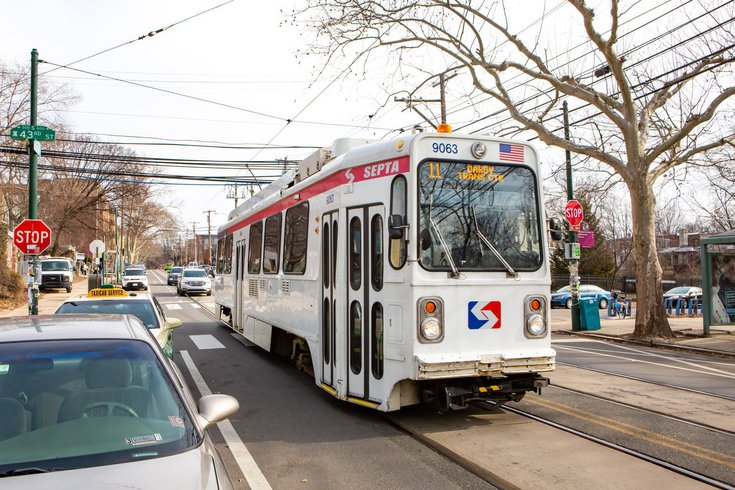
April 19, 2022
 Thom Carroll/For PhillyVoice
Thom Carroll/For PhillyVoice
All SEPTA passengers and employees will no longer have to wear masks when riding aboard transit vehicles or waiting in stations.
For the first time in almost two years, all SEPTA riders and many employees no longer have to wear face masks.
The transportation authority said Monday that its system-wide COVID-19 mask requirement has been lifted. The policy change applies to all SEPTA passengers and employees aboard buses, trains, trolleys or subways, as well as those in stations and concourses.
SEPTA said masks are still recommended throughout the system, citing guidance from the U.S. Centers for Disease Control and Prevention.
SEPTA employees working inside offices, districts and shops within Philadelphia are still required to wear face coverings until further notice due to the city's COVID-19 indoor mask mandate that was reinstituted Monday.
'The Philadelphia Department of Public Health did not immediately respond on Tuesday to a request for comment on SEPTA's changes.
The public transportation system's decision to end its COVID-19 mask requirement came hours after a federal judge in Florida on Monday threw out a nationwide rule requiring passengers and staff wear face coverings while on public transportation. Judge Kathryn Kimball Mizelle ruled that the CDC did not have the legal authority to enforce such a rule.
The public health agency last week had extended the federal mask requirement for public transportation through May 3. TSA official said Monday that the agency would not be enforcing the requirement for the time being. The Biden administration is reviewing the court's ruling and assessing whether to appeal the decision.
Face masks had been mandatory on airplanes, trains and buses since in February 2021. That rule also required they be worn in airports, train stations and other transportation hubs. SEPTA had implemented its own COVID-19 mask mandate for riders and employees in June 2020.
The federal judge's ruling Monday left airlines, transit authorities and transportation hubs to figure out their own mask-wearing guidances.
Amtrak riders and employees are no longer be required to wear masks while onboard trains or in stations. Amtrak's COVID-19 mask mandate took effect in May 2020.
NJ Transit's COVID-19 mask requirement, which has been in place since April 2020, will no longer be enforced on trains and buses, Gov. Phil Murphy said Tuesday.
Most major U.S. airline carriers, including American and Southwest, lifted their COVID-19 mask rules on domestic flights.
Fliers and workers will still be required to wear face coverings in terminals at Philadelphia International Airport because of the city's COVID-19 mask rules. The airport's own face mask policy have been in place since May 2020.
On Monday, Philly became the first major U.S. city to reinstate its COVID-19 indoor mask requirement as coronavirus infections and hospitalizations rise due to the BA.2 omicron subvariant. The change was prompted by a series of metrics in the city's four-tier COVID-19 response level system.
Philly is in it's second level, known as Mask Precautions. It requires face coverings in indoor public settings and businesses. That includes schools and venues such as the Wells Fargo Center. COVID-19 vaccine or testing requirements are not in effect.
The city's COVID-19 infection rates and hospitalizations remain far lower than during previous peaks of the pandemic, but the health department adopted the response level system in February to stay ahead of possible surges and provide a set of transparent metrics that inform guidelines.
The city is averaging 224 new COVID-19 infections per day during the last two weeks, as of Monday. More than 7% of coronavirus tests administered during that period have returned positive results. Case numbers have risen by more than 50% over the last 10 days. There are currently 82 patients hospitalized due to COVID-19.
Philly can return to All Clear, the least restrictive tier, once average new infections per day drop below 100 and hospitalizations fall under 50, so long as the number of coronavirus cases do not increase by more than 50% over a 10-day period.
A group of city businesses and residents have filed a lawsuit in Commonwealth Court to stop the mask mandate, arguing that Philly doesn't have the legal authority to enforce such a requirement.
The CDC currently does not recommend masking in Philly, but the health department said the agency leaves room for the consideration of local conditions.
The BA.2 omicron variant has become the dominant coronavirus strain in the country, accounting for almost 86% of new infections, according to the CDC. BA.2 is a more contagious omicron variant that spreads about 30% more easily and is believed to be more effective at evading the immune system, experts say.
BA.2 already has caused a second wave of omicron infections in parts of Europe and became the dominant strain in South Africa, India and the Philippines. Scientists in the U.S. have been concerned that it could cause another spike in cases here because most states have dropped their COVID-19 restrictions.
Follow Pat & PhillyVoice on Twitter: @Pat_Ralph | @thePhillyVoice
Like us on Facebook: PhillyVoice
Add Pat's RSS feed to your feed reader
Have a news tip? Let us know.